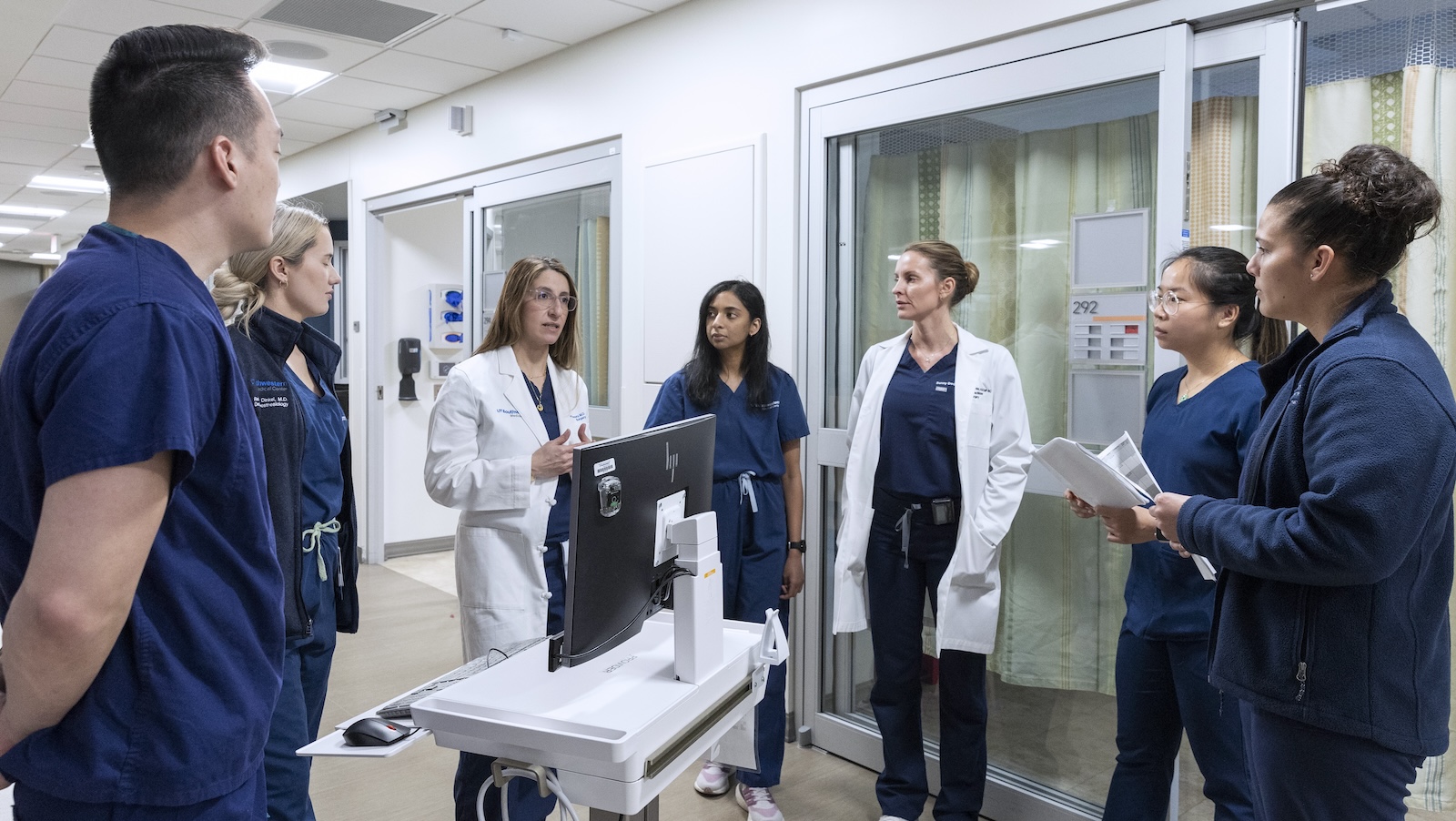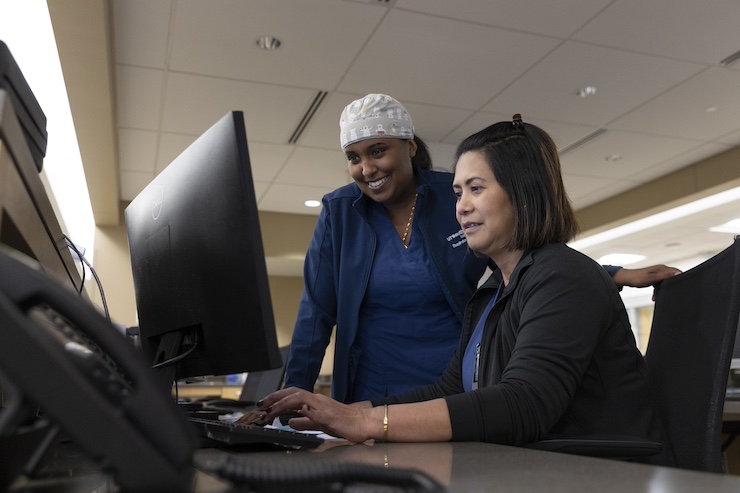William P. Clements Jr. University Hospital
Intensive Care Units (ICUs)
6201 Harry Hines Blvd.
Dallas, Texas 75390 (Directions)
214-633-4700
William P. Clements Jr. University Hospital has six state-of-the-art intensive care units (ICUs). Each is staffed by a team of critical care experts who are committed to providing a compassionate, healing environment to serve patients. This includes our Cardiac Intensive Care Unit (CICU), Cardiovascular Intensive Care Unit (CVICU), Medical Intensive Care Unit (MICU), Neuroscience Intensive Care Unit (Neuro ICU), Neonatal Intensive Care Unit (NICU), and Surgical Intensive Care Unit (SICU).
Care provided in the ICU is complex. Please be assured our team monitors each patient’s health status and vital signs 24/7. This includes any alarms that signal medical changes and movement.
We encourage families and patients to join our ICU team for daily structured multidisciplinary rounds. This is when our doctors, nurses, and other medical experts come together and discuss a patient’s status and plan of care for the day. Families and patients are invited to participate in “rounds” and ask questions.

What to Expect
- Experienced ICU team providing advanced round-the-clock care
- 24/7 monitoring of a patient’s vital signs and health status, including alarms alerting us to medical changes and movement
- ICU charge nurse and a team of nurses available to assist throughout the day
- Daily structured multidisciplinary rounds to develop and monitor a patient’s plan of care
- Communication among the ICU team as well as other UT Southwestern physicians providing care throughout the day, which includes treatment decisions by providers, information about procedures, and updates on the patient’s status
How Family, Friends, and Caregivers Can Help
Designating one family member, or a very limited number of individuals, to ask questions on behalf of the family and patient is important. One of their most important duties is participating in our daily structured multidisciplinary rounds. It is a specific time to speak with our ICU physicians and share observations about the patient.
The spokesperson(s) has the responsibility of communicating information about the patient and plan of care received from the ICU team to family members and friends. This includes answers to questions provided during “rounds.”
Also, we’ve attached a note sheet. Please feel free to print it out help with jotting down information from our ICU team, questions and observations about the patient.
Please review our ICU Glossary of Terms and Frequently Asked Questions for information to help explain medical care in the ICU, including procedures, tests, and equipment in the room.
It is important to take a few minutes to read our ICU Visitor Guidelines. Please follow them when seeing a loved one. These guidelines help protect the health and safety of our patients and ICU team staff members, which are our top priorities.

Coordination of Care and Shift Changes
Our attending critical care physicians lead the ICU team. Fellows, residents, and advanced practice providers are also present in the ICU 24 hours a day. The ICU team will rotate on a weekly or monthly basis.
Our charge nurses work closely with all members of the ICU team and manage care for patients. This includes communicating with patients and family members as needed. Charge nurses are also responsible for handling admissions and transfers within the ICU.
ICU nurses are present at all times. They change shifts twice a day – in the morning and evening.
When our nurses change shifts, they conduct bedside reports. This is when they coordinate and discuss the patient and care being received. We encourage designated family spokespersons along with the patient, when possible, to participate.
Daily Structured Multidisciplinary Rounds
A multidisciplinary team of physicians, advanced practice providers, nurses, therapists, and other experts trained in critical care lead our UT Southwestern ICU teams.
Our ICU team members come together to discuss the patient’s current medical condition and determine the plan of care during “rounds.” This also provides a set time for the family to receive information and ask questions.
Pain control, sedation, mobility, mental status (confused or not), nutrition, and skin health (wounds) are discussed. When applicable, progress in getting a patient off the ventilator, as well as any other devices or machines, is also discussed.
Rehabilitation Therapy and Early Mobilization
Depending on the goals and treatment plan for an ICU patient, physical and occupational therapists assess how they can improve the patient’s strength and conditioning. Family support is encouraged to help encourage and motivate participation.
Respiratory Therapy
A respiratory therapist provides care to ICU patients with breathing difficulty or lung disease. This includes daily breathing treatments to improve their lung function.
ICUs at Clements University Hospital
Cardiac Intensive Care Unit (CICU): Provides care to patients with serious heart conditions, such as heart failure, heart attacks, angina, dysrhythmia, and other conditions.
Cardiovascular Intensive Care Unit (CVICU): Dedicated to the constant and close monitoring and care of patients who have undergone heart, lung, or vascular surgery, including heart or lung transplantation.
Medical Intensive Care Unit (MICU): Specialized care of adult patients with complex medical conditions (lung, liver, kidney, or gastrointestinal conditions as well as infections) who need frequent observation, medical treatment, and specialized monitoring.
Neuroscience Intensive Care Unit (Neuro ICU): Designed for the monitoring and treatment of patients with complex neurological conditions, including stroke, brain aneurysms, seizures, and other complex neurological conditions that may require surgery.
Neonatal Intensive Care Unit (NICU): Level 3 NICU, offering comprehensive on-site care for infants of all gestational weights and ages, as well as treatment for high-risk infants. We partner with Children’s Medical Center Dallas to provide full-time support for all critical-care cases.
Surgical Intensive Care Unit (SICU): Dedicated to the constant and close monitoring and care after major elective or emergency surgery, including for cancer, vascular conditions, and liver or kidney transplantation.
Visiting Guidelines for Adult ICUs
These policies help protect the health and safety of our patients and staff. They may change at any time to support this.
- If you are feeling unwell, please refrain from visiting the hospital.
- Two visitors are allowed in the room at a time.
- One visitor is permitted to stay overnight in a patient’s ICU room. Learn about our visitation guidelines and overnight stays at our hospital.
- We do not recommend children under age 12 to be in the ICU rooms except under limited circumstances. However, if visiting, children must be accompanied by an adult at all times. The accompanying adult cannot be the patient.
- When you’re not in the patient’s room, please use the waiting room.
- To help protect patient privacy, limit traffic in the hallways/doorways of the rest of the unit.
- Please do not bring outside food or gifts of flowers/plants into the ICU. This is for infection control.
- Patient valuables and personal medications should be sent home with a trusted family member.
- Remember to wash your hands when entering or leaving your loved one’s room. We also ask that visitors adhere to infection control protocols and wear a gown/mask/gloves when applicable.
- For the safety of your loved one, please do not touch health care equipment or alarms.
- Each of our ICUs may have additional guidelines for visitors.
Additional Visiting Guidelines for Neonatal ICU (NICU)
Babies and their parents are kept together as much as possible in the NICU. This includes private rooms for overnight stays. Visiting guidelines for parents are included in the NICU information we will provide.

